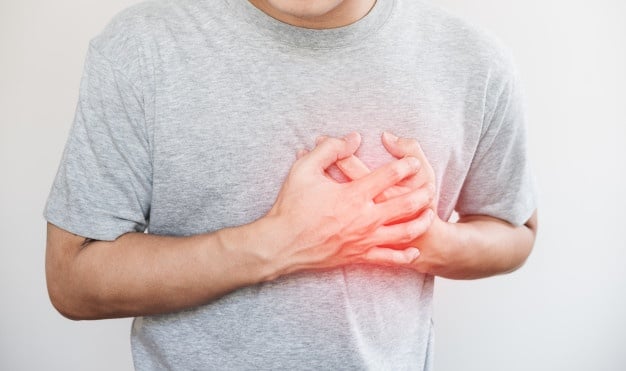
A silent heart attack is just as life-threatening as a normal heart attack. But what is a silent heart attack? Your heart needs oxygen-rich blood to function. If plaque (which consists of fat, cholesterol, and other substances) builds up in the arteries that carry blood to the heart, this blood flow can be significantly or completely cut off. The longer your heart doesn’t have blood flow, the more damage occurs. As the attack might be silent, it can easily not be noticed. They can cause a significant amount of damage and can be deadly without any treatment.
The good news is that you can prepare by knowing these 4 silent signs of a heart attack.
Four signs of a silent heart attack are:
1. Chest pain, pressure, fullness, or discomfort

Most heart attacks only involve only mild pain or discomfort in the center of your chest. You may also feel pressure, squeezing, or fullness. These symptoms usually start slowly, and they may go away and come back. This can be complicated because these symptoms may be related to something less serious, such as heartburn. But if you feel it is something more serious you need to be evaluated by a physician or even head to the emergency room.
2. Discomfort in other areas of your body
A heart attack affects the whole body along with the heart. So, it can be confusing to predict heart attacks at times.
You may experience pain or discomfort in your:
- Arms (one or both of them)
- Back
- Neck
- Jaw
- Stomach
The symptoms can differ from person to person. For example, some people describe their back pain from a heart attack as feeling like a rope being tied around them. You may also feel heavy pressure on your back. Either way, if you think you’re experiencing any of these less obvious signs of a heart attack, don’t ignore them.
3. Difficulty breathing and dizziness
Shortness of breath can occur with or without chest pain, and it’s a common sign of a silent heart attack. Feeling dizzy and light-headed is also one of the symptoms. There is also a possibility that you could faint. Though this can happen to both men and women, it’s more common for women to experience shortness of breath. If you’re having trouble with tasks that weren’t previously difficult, make sure you get it checked out in case it’s a subtle sign of a heart attack.
4. Nausea and cold sweats
Waking up in a cold sweat, feeling nauseated, and vomiting may be symptoms of the flu, but they can also be signs of a silent heart attack. If you feel it’s something more than just the flu, don’t chalk these symptoms up to the flu, stress, or simply feeling under the weather. Such symptoms can be way more serious than they seem.
Being aware of the silent signs of a heart attack is important, but it does nothing if you ignore them. These signs don’t always mean you’re having a heart attack but it’s better to be cautious. The chances of surviving a heart attack are higher the sooner you get emergency treatment. The best way to prevent heart attacks in the first place is to get your heart screened and lower your risk in other ways like keeping your blood pressure and cholesterol at levels that are good for your heart.
